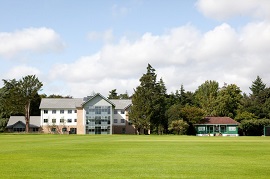From financial planning and estates management to HR, operations and risk oversight, the bursar’s role is central to independent school’s strategic direction and long-term success. These professionals play a vital part in ensuring that the school runs efficiently today while remaining resilient and future-ready.
There’s no fixed route into the role. Many come from diverse professional backgrounds – including finance, estate management, project leadership, the armed forces and beyond. What unites them is a strategic outlook, sound judgement, and a practical approach grounded in a deep commitment to helping schools thrive.
A modern and evolving role
The title of 'bursar' is still widely recognised, but many schools now refer to this role as Director of Finance (DoF), Director of Operations (DoO), Chief Operating Officer (COO) or similar. These titles reflect the growing breadth and strategic nature of the role in today’s schools. The ISBA supports professionals across all these positions with expert guidance, professional development, and strong business connections and peer network. ISBA's regional meetings, conferences and annual conference also provide opportunities for experiences to be shared and problems discussed.
As schools continue to respond to shifting pressures and opportunities, the role of the bursar continues to evolve. Today’s bursars are often involved in shaping school strategy, leading sustainability projects, and supporting development and marketing alongside the senior leadership team.
What Does a Bursar Do?
While each school is unique, bursars and operational leaders typically oversee three key areas: Finance and Accountancy, General Management and Administration, and Estates and Facilities. Their work supports both the day-to-day operation of the school and its long-term sustainability.
Finance and Accountancy
- Advising on general financial policy within the school.
- Preparing annual estimates of income and expenditure to include the preparation of departmental budgets within the school, the latter in consultation with the head or senior academic staff.
- Monitoring income and expenditure in relation to budget and presenting regular management reports to the governing body.
- Keeping the accounts of the school and preparing Statements of Financial Activity (SOFA) and balance sheets in accordance with the charities Statement of Recommended Practice (SORP).
- Maintaining cash flow projections for the current and future years.
- Advising on investments in consultation with the school's brokers or investment managers.
- Preparing pupils' bills and collecting all fees and extras.
- Payment of all salaries and wages, including PAYE, Superannuation and National Insurance Contributions and compliance with regulations for benefits in kind.
- Administering pension schemes for teaching and non-teaching staff.
- Scrutinising and passing for payment all invoices received in the school.
- Organising special appeals for capital projects or endowment funds.
- Keeping analyses of costs and other statistical records.
- Preparing forecasts for the future financial performance of the school; usually over a period of five years.
- Preparing financial appraisals of particular projects.
- Advising on taxation matters generally, including covenants from subsidiary companies to the parent charity and, where appropriate, ensure compliance with regulations for VAT.
- Advising on the financial implications of the charitable status of the school.
- Dealing with the school's income tax and rating assessments.
- Operation of an Advanced (Composition) Fees Scheme.
- Advising on scholarship and bursary funds and undertaking assessments of parents' income and assets prior to making bursary awards.
- Involvement in the marketing and development of the school - this role is beginning to emerge but must be balanced against other commitments and a separate appointment of development director is often made.
General Management and Administration
- Acting as clerk to the governors and secretary to various committees and trusts.
- Ensuring compliance with all relevant aspects of employment law including employment protection, equal pay, minimum wage, Working Time Directive or discrimination on the grounds of sex, race or disability.
- Acting as the head's adviser on employment matters including disciplinary procedures and ensuring that the school has appropriate disciplinary and grievance procedures.
- Ensuring that all relevant staff have contracts of employment and keeping the school's standard contracts up-to-date as new legislation takes effect.
- Managing the employment, terms and conditions of service, supervision and welfare of all non-teaching staff.
- Formulating, monitoring and implementing the school's policy to comply with the requirements of health and safety legislation. This could include acting as the health and safety assistant within the school and as chair of the health and safety committee. Carry out risk assessments where appropriate and monitor all departments to ensure that they are carrying out risk assessments. Take professional advice as required.
- Ensuring that the school has adequate insurance cover at all times to include employer's liability, buildings and equipment cover, personal accident, travel insurance and other relevant cover. Professional advice should invariably be sought.
- Purchasing, either directly or through a purchasing group, all goods and services for the school.
- Arranging for staff accommodation and dealing with the letting of property to school employees and third parties; ensuring that the appropriate leases and licenses to occupy are signed by the tenants.
- Letting of school premises to outside organisations.
- Acting as correspondent with the Department for Education (DfE) and being responsible for the records and returns required.
- Advising on and taking the appropriate physical security measures within the school for protection of both staff and pupils.
- Maintaining contact with the statutory authorities and other organisations.
- Catering which may be contracted out.
- Cleaning which may also be contracted out.
- The swimming pool and its plant, with the need to ensure that proper safety procedures are enforced, particularly for out-of-school hours and during the holidays.
- Overseeing the management of the school shop and uniform shop.
- Overseeing the management of the laundry facilities.
- Management of sports equipment and facilities.
- Minibuses and transport - compliance with the regulations for the operation of minibuses; driver training and assessments; servicing and vehicle inspectorate tests.
School Buildings
- Maintenance of school buildings including the preparation of maintenance schedules and keeping of records.
- Managing the installation and maintenance of equipment for the detection, warning, protection and escape from fire ensuring the necessary fire risk assessments are carried out.
- Maintenance and efficiency of the installations and plant for electric and gas supply, heating, domestic hot water, water softening etc. Letting of energy supply contracts at competitive rates, either directly or through a purchasing group. Promotion of energy conservation.
- Ensure that catering areas meet the requirements for hygiene and food safety.
- Managing the maintenance of the lighting and ventilation in all school buildings.
- Drawing up outline specifications for new buildings, obtaining tenders, planning permission, liaison with school architects and builders.
School Grounds
- Upkeep of playing fields, gardens, all weather surfaces, running tracks and tennis courts.
- Land drainage.
- Maintenance of boundaries, roads and rights of way.
Support from ISBA
ISBA supports bursars and operational leaders with a range of services designed to meet the demands of running a modern independent school. Member schools benefit from:
- Practical support from ISBA’s Advice and Guidance team and to the comprehensive Reference Library, giving you confidence in your decisions and saving valuable time.
- Professional development delivered through regional meetings, webinars and in-person conferences - helping you and your operational team stay informed, connected and equipped to lead effectively.
- Tailored recruitment advice to help your school attract and retain the right candidates for key operational roles, alongside career development guidance for individuals looking to grow within the sector.
- Access to a business support network that understands the sector and offers trusted, practical solutions to help schools operate efficiently and sustainably.
Together, these areas of support ensure our member schools are well equipped to meet current challenges and plan for what’s ahead.



